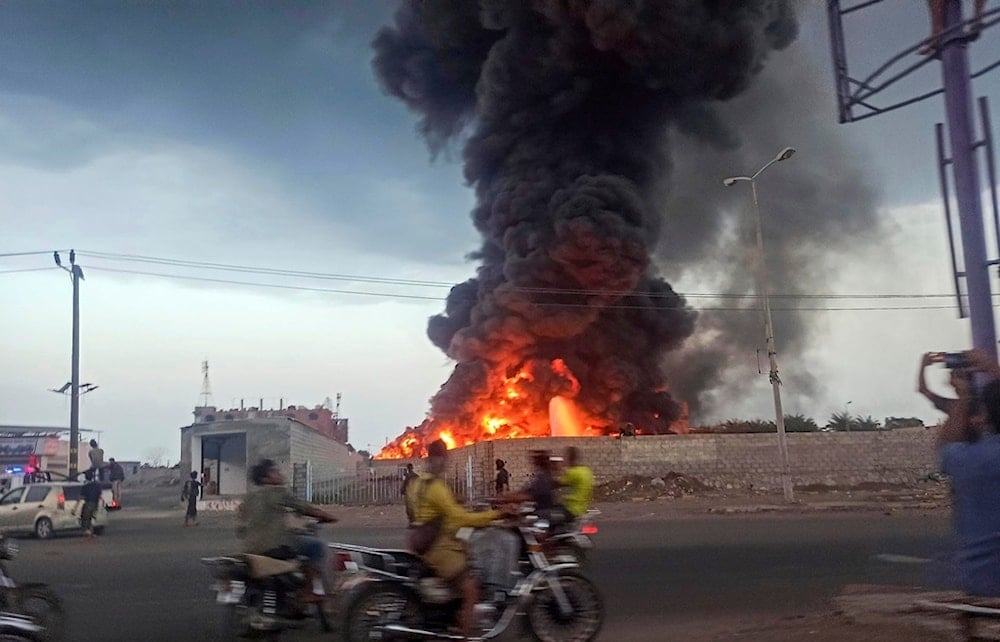Will Biden's blunders in Yemen carry over to Trump?
The Biden administration's policy on Yemen has proven disastrous in light of the aerial bombardment that provokes the Yemenis to strike US naval assets, causing tremendous losses for Washington.
-

A large fire and plume of smoke is visible in the port city of Hodeida, Yemen, following an Israeli airstrike on Sunday, September 29, 2024. (AP)
The US military campaign against Ansar Allah in Yemen has now entered its second year. Responsible Statecraft cited new reports based on two sources in The Jerusalem Post, saying that the Trump administration may plan to escalate the conflict further. The report suggests that the Biden administration intends to intensify its bombing campaign before January 21, paving the way for Trump to escalate military actions once he assumes office.
"Trump will not stand for having US Navy ships attacked every day by the Houthis using Iranian missiles. … He will hit the Houthis harder, and he will threaten Iran that if a missile [that] Iran supplied kills an American, Iran will get hit directly," former Trump administration Iran envoy Elliott Abrams said.
Trump's potential escalation in Yemen aligns with his national security team's hawkish tendencies and reflects his approach to Yemen during his previous term in office. Judged by its results, the US-led aggression on Yemen has been a failure, consuming resources without deterring attacks by Ansar Allah on commercial shipping, which they have been carrying out as part of a de facto blockade on the Israeli occupation over the war on Gaza.
In addition to intensifying the bombing campaign, reports suggest the Trump administration may consider reinstating Ansar Allah on the Foreign Terrorist Organization (FTO) list. This move, which was reversed by the Biden administration due to warnings about its humanitarian impact, could further destabilize Yemen. Critics of Biden's reversal have labeled it as a "weakness" and pushed for redesignation.
Trump's history of escalating inherited conflicts, combined with his disregard for congressional oversight in matters of war, raises concerns about the legality and consequences of further military action in Yemen. Escalation is unlikely to achieve significant results and risks worsening the humanitarian crisis while endangering US forces.
The US should focus on ending broader regional conflicts, including the war on Gaza, rather than expanding its military involvement in Yemen, Responsible Statecraft stressed.
Yemen concerned with Gaza peace
The Minister of Foreign Affairs in the Sanaa government, Jamal Ahmad Amer, affirmed to the UN Secretary-General's Special Envoy for Yemen, Hans Grundberg, that there was no basis for linking the peace process in Yemen with its military operations in support of the Gaza Strip.
During his meeting with the UN envoy, the minister pointed out that Ansar Allah leader Sayyed Abdul-Malik al-Houthi had proposed a simple, fair, and less costly equation: ending the genocide in Gaza in exchange for halting Yemen’s operations.
However, emphasized Amer, Washington is solely concerned with the interests of the Israeli entity, defending it without regard for humanitarian issues, amid blatant UN inaction.
He further stated that Sanaa’s strategic choice is to achieve just and lasting peace that does not allow internal conflicts.
According to the minister, Sanaa stands unified in its position and objectives, unlike the opposing side, which is fragmented by various affiliations and loyalties.
He continued by noting that the US directed the Saudi regime to halt progress on the UN roadmap between Sanaa and Riyadh and declared that there would be no peace or salaries in Yemen unless it ceased its operations in support of Gaza.

 3 Min Read
3 Min Read








